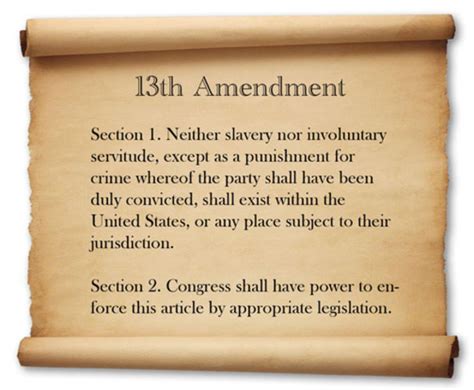Introduction

The 13th Amendment to the United States Constitution, ratified in 1865, stands as a pivotal milestone in the fight for equality and the abolition of slavery. Its profound impact on American society and its ongoing relevance in the 21st century cannot be overstated.
Section 1: Banning Slavery and Involuntary Servitude
The 13th Amendment unequivocally states: “Neither slavery nor involuntary servitude, except as a punishment for crime whereof the party shall have been duly convicted, shall exist within the United States, or any place subject to their jurisdiction.”
This provision abolished the institution of slavery in all forms, including involuntary servitude and peonage. The amendment ensured that no person could be held against their will or forced to perform labor without their consent.
Reconstruction Era and Enforcement
In the aftermath of the Civil War, Congress passed the 13th Amendment as part of the Reconstruction Act of 1865. The 14th and 15th Amendments followed, further extending civil rights to African Americans.
However, enforcement of the 13th Amendment proved challenging. Resistance to racial equality persisted in many Southern states, leading to sharecropping, labor contracts, and other forms of coercion that resembled slavery.
Black Codes and Jim Crow Laws
In the decades following Reconstruction, many states in the South enacted Black Codes, which restricted the rights of African Americans. These laws effectively nullified the 13th Amendment by imposing vagrancy laws, poll taxes, and other measures designed to suppress black citizens.
The rise of Jim Crow laws in the late 19th and early 20th centuries further cemented a system of racial segregation and inequality. The 13th Amendment was essentially undermined by these oppressive policies.
20th Century Reassertion
The 20th century witnessed a resurgence of efforts to enforce the 13th Amendment. The NAACP Legal Defense Fund, established in 1940, spearheaded legal challenges to segregation and discrimination.
In 1941, the Supreme Court ruled in Edwards v. California that peonage violated the 13th Amendment. This decision provided a legal basis for further challenges to forced labor practices.
Impact of the 13th Amendment
The 13th Amendment has had a profound impact on American society:
- Abolition of Slavery: It ended the institution of slavery and provided the legal framework for the emancipation of approximately 4 million African slaves.
- Extension of Civil Rights: It formed the foundation for subsequent civil rights amendments, including the 14th and 15th Amendments, which expanded voting rights and equal protection under the law.
- Basis for Anti-Discrimination Laws: It has served as a legal basis for numerous anti-discrimination laws, including the Civil Rights Act of 1964 and the Voting Rights Act of 1965.
Ongoing Relevance and the Prison Industrial Complex
Despite the abolition of slavery, the 13th Amendment’s exception clause has been used to justify the use of prison labor. In the United States, an estimated 2 million people are incarcerated, disproportionately African Americans.
The rise of the prison industrial complex has raised concerns that forced labor in prisons may constitute a modern form of slavery. Activists argue that the 13th Amendment should be interpreted to prohibit all forms of involuntary servitude, including prison labor.
Conclusion
The 13th Amendment to the United States Constitution remains a powerful symbol of the struggle for equality and the fight against oppression. It abolished slavery, laid the groundwork for the extension of civil rights, and continues to inspire efforts to address the legacy of racism and discrimination in American society.
As we navigate the 21st century, it is crucial to remember the legacy of the 13th Amendment and its ongoing relevance in the fight for justice and equality. By understanding its historical significance and grappling with its complexities, we can work towards a more just and equitable society for all.
Tables
Table 1: Timeline of Key Events Related to the 13th Amendment
| Event | Date |
|---|---|
| Abolition of the slave trade | 1808 |
| Emancipation Proclamation | 1863 |
| Ratification of the 13th Amendment | 1865 |
| Black Codes | 1865-1877 |
| Jim Crow laws | 1877-1965 |
| Edwards v. California (Supreme Court ruling against peonage) | 1941 |
Table 2: Impact of the 13th Amendment on African Americans
| Aspect | Impact |
|---|---|
| Slavery | Abolished all forms of slavery and involuntary servitude. |
| Civil rights | Provided a legal basis for subsequent civil rights amendments, extending voting rights and equal protection under the law. |
| Economic opportunities | Freed African Americans from forced labor, enabling them to pursue economic opportunities. |
Table 3: Challenges to the Enforcement of the 13th Amendment
| Challenge | Period |
|---|---|
| Black Codes | 1865-1877 |
| Jim Crow laws | 1877-1965 |
| Prison industrial complex | Late 20th century onwards |
Table 4: Legal Cases Related to the 13th Amendment
| Case | Year | Ruling |
|---|---|---|
| Dred Scott v. Sandford | 1857 | Denied citizenship to African Americans. |
| Thirteenth Amendment | 1865 | Abolished slavery and involuntary servitude. |
| Edwards v. California | 1941 | Illegalized peonage. |
